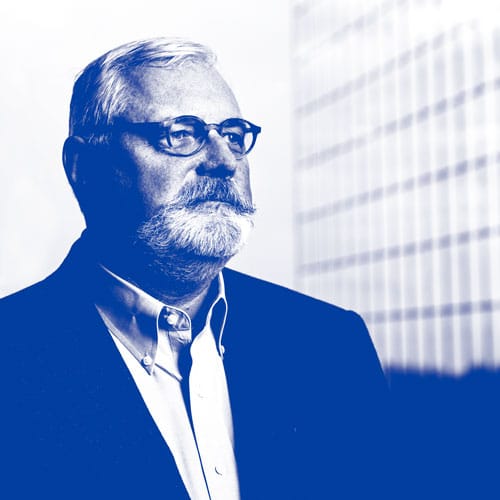You can learn a lot about the oil and gas industry by talking to someone like Kevin Cunningham, vice president and general counsel of Cabot Oil & Gas. In fact, if you were writing a history of the industry in the late twentieth century and early twenty-first century, you could trace the important trends through Cunningham’s career path.

The lawyer’s professional journey has included legal and management positions with eight companies and assignments in numerous countries on four continents. It has been an exhilarating, though at times, bumpy ride. “It’s a volatile business,” Cunningham says. “The highs are great, and the lows are really bloody.”
Cunningham cut his teeth with one of the first companies to drill in unconventional geological formations. He also worked to open drilling opportunities in Russia to foreign investors, and he helped a small, regional company become a national powerhouse by using a new technology called fracking. Through it all, he has experienced booms and busts amid wild price swings in oil and natural gas markets.
Today, Cunningham couldn’t be happier with his role at Cabot, where he tackles a wide variety of issues from litigation to regulation to land rights. He sounds nostalgic at times as he recalls the twists and turns of his professional life. That’s not surprising, considering his accomplishments.
Cunningham’s oil and gas career path began on a yacht in the Gulf of Mexico. Following an unsatisfying one-and-a-half-year stint as a criminal defense attorney—his first job after graduating from the University of Texas Law School—Cunningham signed on as a boat deckhand. This was a soul-searching move, as he pondered what to do next.
The yacht’s owner was an oil and gas industry executive, and he was happy to find out that Cunningham was a lawyer. “At that time, in the early 1980s, the industry was hiring a lot of lawyers,” Cunningham says. “After he found out that I was a lawyer, he’d pick my brain from time to time. Later, he invited me to come to Houston and offered me a job.” The company was in the early stages of drilling in the Austin Chalk Field, a geological formation in Texas that was one of the first instances of development of an unconventional field requiring new drilling techniques.
Cunningham’s responsibilities were to ensure that the title of the land where the company wanted to drill was free of claims or legal entanglements. He spent hours in the basements of small-town courthouses poring over documents, often facing tight deadlines. “Many times the rig was on the way to the site, and I needed to give a verbal go-ahead or put a hold if the title wasn’t clear,” Cunningham says. “This was a lot of fun. I liked the fact that I wasn’t stuck in an office building all day.”
After a couple of years, the Austin Chalk Field closed, but Cunningham’s enthusiasm for the industry was fully fueled. His next step was staff lawyer for Amoco Production Company, a descendant of the old Standard Oil Company. A two-year stint there yielded a wealth of experience including litigation before regulatory agencies.
With his experience broadened at Amoco, he wanted to join a smaller company to test his new skills and take on a wider breadth of responsibility. He found that opportunity with Pennzoil, a company run by a lawyer, Bill Liedtke, and future US president George H. W. Bush. “It sparked my interest that the company was started by a lawyer,” Cunningham says. “I thought, ‘Wow, maybe I could run an oil and gas company someday.”
Aiming to learn as much as he could, Cunningham joined Pennzoil in 1984. Lawyers there were tightly integrated with business units, not just waiting in the wings as legal advisers, as was the norm in the industry. He began working in Appalachia, which was then “the backwater of the industry,” he says. In subsequent years, his assignments took him to the Rocky Mountains, California, Texas, and Louisiana to work on a wide variety of legal matters. After seven years at Pennzoil, Cunningham was promoted out of the legal department to general manager. “That was a real shock to me,” he recalls. “At age thirty-eight, I was given the handlebars to a full operating division.”
In his new leadership position, Cunningham learned a lot about the business and what it was like to be a client to the legal department. A few years later, Pennzoil’s focus shifted to the international arena, and Cunningham had a new job: international business developer. Working with a cross-functional team of geologists, engineers, and technical professionals, his responsibility was to find new areas to develop. “I was to meet with the right people, negotiate contracts to capture the opportunities, and then set up the local office,” he says. “It was a dream job. They essentially gave me a credit card and a map and said, ‘Take a look in China and see if you can get us deals.’”
After two years in China, it was on to Venezuela, then Brazil, and Australia. Racking up the frequent flyer miles, Cunningham also ventured to the Middle East, Egypt, and Europe. By 2000, when Pennzoil was sold, it was time to reach for the big dream—starting his own company. Unfortunately, the startup formed with colleagues from Pennzoil failed after two tough years, primarily due to difficulties lining up financing.
“I lost all my money and decided to go back to practicing law,” Cunningham recalls. He joined El Paso Corporation’s legal team, working on international and domestic acquisitions and divestitures. “El Paso had been kind of an Enron wannabe,” he says. After Enron imploded amid a financial scandal, El Paso managed to survive by holding on to some of its assets instead of selling them all off as Enron had done.
Eyeing new opportunities, Cunningham’s next move was to Russia to work on deals for Urals Energy, a company founded by a college classmate and former Pennzoil colleague. While the work was engaging, after two years enduring Moscow winters, Cunningham wanted a change.
A small company called Chesapeake Energy came calling. It was one of the first companies to explore unconventional development with long, horizontal well bores—a practice also known as fracking.
“They told me, ‘If it works, it’s going to change the world,’” Cunningham recalls. “‘If it doesn’t, companies are going to lose a lot of money.’” The day he started work for Chesapeake ‘in Oklahoma City, he remembers that there were as many as ninety drill rigs in operation. “They said, ‘Take your pick. Which one do you want to work on?’”
Chesapeake turned into a major success, as fracking did change the world of oil and gas development. Cunningham was a part of that, as the company’s stock price raised from about $20 to more than $70 a share. Yet, it crashed to $13 in the depths of the 2008 recession.
In 2009, Cunningham’s interest was piqued by an opportunity at Cabot. The company wanted to hire an assistant general counsel, and the company’s general counsel told him that he was looking to retire in a couple of years. “If you do well, maybe you’d be in line for my job,” he told Cunningham.
Cabot was a venerable company, and it seemed working there would be a more relaxed practice, according to Cunningham. A week after he took the position, his view changed dramatically. The company was hit with one of the first fracking-oriented claims by a regulatory agency, and within the same week, an internal complaint about contractors’ drug use surfaced. Cabot had a small legal staff. “So, it was back to burning the candle at both ends,” he says. The hard work paid off when he was promoted to general counsel in late 2010.
Today, Cabot continues to operate lean. Cunningham has just three others on his legal team, and the company, with a market capitalization of about $15 billion, has just 400 employees. That’s less than half the size of comparably sized energy companies, he says. He and his staff have a great variety of work. They rely on outside counsel and other specialists to handle a robust workload. This structure works because of Cunningham’s—and his other team members’—vast array of industry experience.
Indeed, Cunningham has faced just about every tribulation the oil and gas business could throw at a business leader over the past thirty-five years. While there have been some major setbacks along the way, overall, he looks back fondly on his career and continues to relish the challenges.

